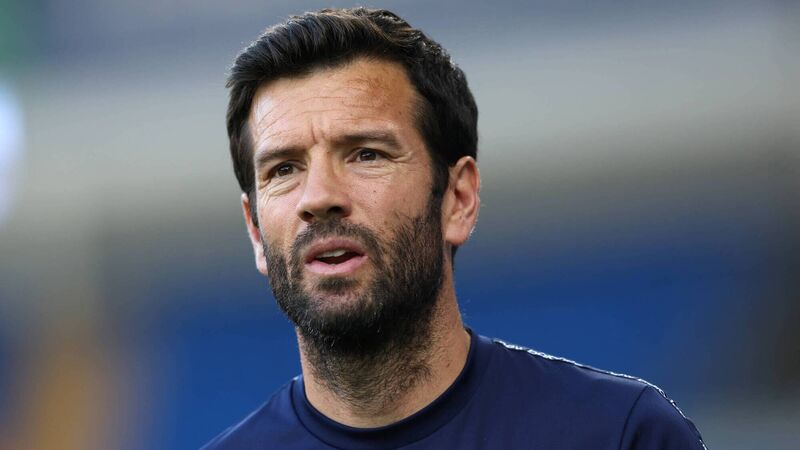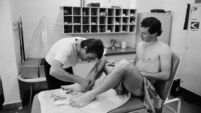Brian Barry-Murphy interview: Learning from Jimmy and Pep, Cardiff's GAA-esque feel and the rise of Irish coaches

SO FAR, SO GOOD: Brian Barry-Murphy, manager of Cardiff City, looks to build on his time at Manchester City and Leicester City by utilising a youthful squad filled with potential. Of his 11 most used players this season, eight are under 24 years old. Pic: Michael Steele/Getty
When Cardiff City came calling, Brian Barry-Murphy could lean on Pep Guardiola as a reference and cite Ruud van Nistelrooy’s glowing praise of his coaching.
More understated, perhaps entirely unknown by many at the League One club, were the leadership skills imbued in him from a young age at home.
The son of Jimmy is thriving on the south coast of Wales, arresting the slide of a club that was in the Premier League seven seasons ago.
There will be bumps on the road back, the first of them a maiden defeat against Bradford City last weekend, but even Barry-Murphy, not in the habit of over-promising, admits it is “so far, so good” with an approach that is influenced heavily by Pep on the pitch and his father in the changing room.
The Bluebirds visit Wigan today, three points off the summit with a game in hand as they look to overwrite last season’s dismal relegation.
Immediate promotion is Barry-Murphy’s top priority. Re-engaging a fanbase that has suffered more than most since they were mixing it with the best is not far behind.
“If you can give those supporters something to feel excited about and get behind, then it can create a momentum that can be difficult to stop,” he says.
One sure-fire way of captivating those whose loyalty has been tested is by promoting young, homegrown players in an environment where they are not afraid to make mistakes – an approach, he says, learned from watching his father’s management of Cork’s hurlers across two distinguished spells.
“When I was younger, I’d always have wanted to be like my father,” he says. “You're mimicking him or you're doing things that seem relatable.
“What I saw in the latter years of my teens when he was managing the hurling team, more than anything else, was the way that you interact with the players and the way you treat them is the most important thing.
“You have to believe in them and give them that sense of being treated fairly and with absolute honesty and decency.
“There's a lot of hard things happening in sport where you have to leave players out and not play them, and they play and their friends don't play and brothers don't play. I think you have to be really aware of how difficult those moments are for the players.
“If you have a real sense of empathy towards them when those decisions are being made, I think eventually the players respect that, even though in the moment it can seem very hard. That was one of the biggest things I took from my father in terms of how he managed those hurling teams.”
Not that the Pep factor should be downplayed. During his three years as Manchester City’s Elite Development Squad chief, Barry-Murphy guided Cole Palmer, Oscar Bobb and Romeo Lavia, to name three of many, along their path to Premier League stardom.
Unsurprisingly his playing philosophy borrows heavily from Pep’s manual, although he is not an evangelist and will tweak his tactics accordingly if he can spot a weakness in the opposition.
“I wouldn’t like to sound like a preacher,” he says.
“My time at City changed my professional sporting life because of what I got to witness on a daily basis from Pep Guardiola. I always had a vision of what I wanted to do and what I got from him was a way of bringing it to life and a training programme that showed me how to do it.”
Arriving at Leicester, mired in off-field chaos, midway through a season that already looked doomed was “unexpected” last winter but it also allowed him a chance to apply the knowledge absorbed from the City machine in a senior dressing room.
Van Nistelrooy had no hesitation in putting Barry-Murphy in charge of training. While results were dire, the mitigating circumstances were many and the endorsement from one of the Premier League’s greatest goalscorers was ringing.
“He’s a great coach,” Van Nistelrooy said before being sacked. “I wanted him to be part of my team because he can translate a certain way of playing into a training model.
“It’s vital that you have somebody like that on board. He’s doing an excellent job – especially on the training pitch.”
For Barry-Murphy it was an opportunity to “put everything learned over the course of that three years (at City) to the test” and the emergence of Jeremy Monga, a 16-year-old now being watched by Real Madrid, as a first-team regular underlined the Corkman’s knack for bridging the daunting gap between youth team and the senior ranks.
Leicester may have been in freefall but Barry-Murphy’s reputation was so unharmed that when Cardiff and their capricious owner Vincent Tan were searching for a head coach they decided he was the right choice to maximise the potential of a young squad.
Helpfully, that was what attracted Barry-Murphy to south Wales too.
“I was aware of their potential, so I thought if I could improve them and give them the opportunity to play, then the potential for the club to do well was enormous,” he says.
“Everything felt right for me at the right time in my career to do that type of job and the owner was as passionate about bringing the club back to where they once were.”
Of his 11 most used players so far this season, eight are under 24 and the only squad members aged 30 are Callum Robinson and Calum Chambers, neither of whom are regulars.
Attacking midfielder Rubin Colwill, now 23 but at the club since he was eight, has levelled up, while younger brother Joel is becoming more prominent in a holding role. Teenagers Ronan Kpakio and Dylan Lawlor are earning rave reviews at the back.
Again, Barry-Murphy says the key is simply ensuring they are learning without the fear of being punished for mistakes. During his own lengthy playing career, he remembers the constant worry of being dropped after a bad game.
He never wants his players to feel that way and prefers to communicate his decisions behind leaving someone out clearly, fostering a deeper level of trust.
“All players want to get that sense of being believed in and that we’re really investing in them,” he adds. “When I was a player, if you had one or two bad games, you were always anticipating being dropped or not playing. I think you want to build something much deeper than that where if you have a game here and it doesn't go perfect, you’re not going to be dropped, you’re not going to be banished.
“That can be the most powerful part of their experience in making them improve quicker than what would be expected.”
Twenty-six years have passed since he left Cork City for Preston North End as a promising midfielder but Barry-Murphy still longs for home. He returns whenever possible, even if the new gig makes the logistics more tricky, and checks the GAA club championship results most weekends, “especially since Jimmy’s now a selector with the Barrs’ footballers".
He made it to last year’s All-Ireland hurling final but couldn’t get away from pre-season to witness this July’s nightmare collapse. “Thank God,” he says.
There have been regular conversations with Pat Ryan over the past couple of years and he has been watching the intercounty teams “from a semi-professional point of view” with the biggest lesson being “a timely reminder of how volatile or how fine the margins are in top-level sports”. So much about Cardiff and its tight sense of community reminds him of the GAA.
Last week he drove an hour out of town, deep into the Valleys and past villages he had never heard of, for the latest in a series of engagements with fans.
“I like to get a feel of what these places are like,” he adds. “I've never been to these places in my life, so when you go into them, you get a real sense of what the club means to these people and how big a part it plays in their lives.
“Very GAA-esque, where you go to these different places. GAA clubs are the cornerstone in the community. It's like that here but on a much larger scale.
“If you go into different supporters clubs around the Valleys or in Barrytown, their lives revolve around travelling to Cardiff, they are at every away game. Generations of families are obsessed with the club.
“It gives you a real sense of determination to try and give them what they want, which is a team to get behind and play in a manner that makes them genuinely excited.
“That is the objective but I can't guarantee it's going to happen all the time.”
There will be another reminder of home soon when he sees Conor Hourihane in the Barnsley technical area, though the fixture’s initial date was postponed because of next month’s international break. “That will be good craic,” Barry-Murphy says. “Conor was a much better player than me.
"I think Conor is a great fella. Every time I’ve met him, I would have the world of time for him. Although obviously during the game we'll do our best to win.”
Four years ago there was not a single Republic-born manager in England’s top four divisions; the Cork pair are among six presently in jobs including Alan Sheehan at Cardiff’s great rivals Swansea.
Another four represent north of the border, most notably Kieran McKenna at Ipswich.
“The availability of getting into coaching is probably there for us,” Barry-Murphy continues. “I think the managers from our part of the country who are operating and doing so well, it probably does give others a sense of, ‘We can do this as well.’
"I think the more of us that can be actively seen to be doing as well as we can will probably encourage more and more of our fellow countrymen to try and do it. Hopefully that will continue to increase throughout the years ahead.”
This presents an interesting contrast compared to the increasing struggles facing the next generation of players searching for opportunities at the very top level.
Barry-Murphy has seen up close how the Premier League’s Elite Player Performance Plan has transformed the development of young English players and is convinced a smaller-scale strategy in Ireland would reap handsome rewards.
The problem, as ever, is money.
“The returns have been enormous,” he says of the EPPP. “There's probably something in that for Ireland as well where we can improve facilities and get the players into more contact in terms of training more often.
“That inevitably leads to an increased calibre of players being brought through into the professional phase, which is then the most important thing of getting players into the national team at a senior level.
“The more finance that you can invest in that from an Irish perspective would only benefit us, as long as it's invested in the right type of infrastructure in the right areas and that means the players can access the increased contact time that they need with the coaches and the teams.”





